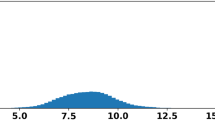Abstract
This paper deals with the interpretation of biomedical multivariate time series for extracting typical scenarios. This task is known to be difficult, due to the temporal nature of the data at hand, and to the context-sensitive aspect of data interpretation, which hamper the formulation of a priori knowledge about the kind of patterns to detect and their interrelations. A new way to tackle this problem is proposed, based on a collaborative approach between a human and a machine by means of specific annotations. Two grounding principles, namely autonomy and knowledge discovery, support the co-construction of successive abstraction levels for data interpretation. A multi-agent system is proposed to implement effectively these two principles. Respiratory time series data (Flow, Paw) have been explored with our system for patient/ventilator asynchronies characterization studies.
Preview
Unable to display preview. Download preview PDF.
Similar content being viewed by others
References
Thille, A., Rodriguez, P., Cabello, B., Lellouche, F., Brochard, L.: Patient-Ventilator Asynchrony During Assisted Mechanical Ventilation. Intens. Care Med. 32(10), 1515–1522 (2006)
Salatian, A., Hunter, J.: Deriving Trends in Historical and Real-Time Continuously Sampled Medical Data. J. Intell. Inf. Syst. 13(1-2), 47–71 (1999)
Shahar, Y.: A Framework for Knowledge-Based Temporal Abstraction. Artif. Intell. 90(1-2), 79–133 (1997)
Augusto, J.C.: Temporal Reasonning for Decision Support in Medicine. Artif. Intell. Med. 33(2), 1–24 (2005)
Fromont, É., Quiniou, R., Cordier, M.O.: Learning Rules from Multisource Data for Cardiac Monitoring. In: Miksch, S., Hunter, J., Keravnou, E.T. (eds.) AIME 2005. LNCS (LNAI), vol. 3581, pp. 484–493. Springer, Heidelberg (2005)
Guimarães, G., Peter, J.H., Penzel, T., Ultsch, A.: A Method for Automated Temporal Knowledge Acquisition Applied to Sleep-Related Breathing Disorders. Artif. Intell. Med. 23(3), 211–237 (2001)
Silvent, A.S., Dojat, M., Garbay, C.: Multi-Level Temporal Abstraction for Medical Scenarios Construction. Int. J. Adapt. Control. 19(5), 377–394 (2005)
Zupan, B., Holmes, J., Bellazzi, R.: Knowledge Based Data Analysis and Interpretation. Artif. Intell. Med. 37(1), 163–165 (2006)
Kabanza, F., Bisson, G., Charneau, A., Jang, T.S.: Implementing Tutoring Strategies Into a Patient Simulator for Clinical Reasoning Learning. Artif. Intell. Med. 38(1), 79–96 (2006)
Lee, E., Chan, C., Aalst, J.: Students Assessing their Own Collaborative Knowledge Building. Int. J. of Computer-Supported Collaborative Learning 1(1), 57–87 (2006)
Morik, K., Imhoff, M., Brockhausen, P., Joachims, T., Gather, U.: Knowledge Discovery and Knowledge Validation in Intensive Care. Artif. Intell. Med. 19(3), 225–249 (2000)
Schroeder, L., Bazzan, A.: A Multi-Agent System to Facilitate Knowledge Discovery: An Application to Bioinformatics. In: Proceedings of the Workshop on Bioinformatics and Multiagent Systems (2002)
Bottoni, P., Garbay, C., Lecca, F., Mussio, P., Rizzo, P.: Collaborative Indexing and Retrieval by Annotation: the Case of Artistic Artifacts. In: Proceedings of the 2nd International Workshop on Content-based Multimedia Indexing, pp. 315–322 (2001)
Dousson, C., Duong, T.: Discovering Chronicles with Numerical Time Constraints from Alarm Logs for Monitoring Dynamic Systems. In: Dean, T. (ed.) Proceedings of the 16th International Joint Conference on Artificial Intelligence, pp. 620–626. Morgan Kaufmann, San Francisco (1999)
Author information
Authors and Affiliations
Editor information
Rights and permissions
Copyright information
© 2007 Springer-Verlag Berlin Heidelberg
About this paper
Cite this paper
Guyet, T., Garbay, C., Dojat, M. (2007). A Human-Machine Cooperative Approach for Time Series Data Interpretation. In: Bellazzi, R., Abu-Hanna, A., Hunter, J. (eds) Artificial Intelligence in Medicine. AIME 2007. Lecture Notes in Computer Science(), vol 4594. Springer, Berlin, Heidelberg. https://doi.org/10.1007/978-3-540-73599-1_1
Download citation
DOI: https://doi.org/10.1007/978-3-540-73599-1_1
Publisher Name: Springer, Berlin, Heidelberg
Print ISBN: 978-3-540-73598-4
Online ISBN: 978-3-540-73599-1
eBook Packages: Computer ScienceComputer Science (R0)




